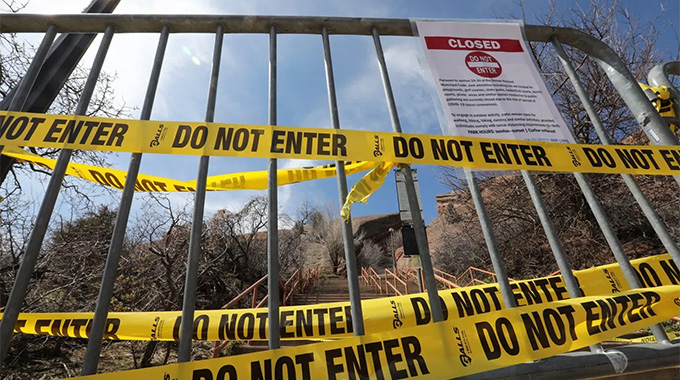
CPR News
by Sam Brasch
It’s been a strange few weeks for academics who study the climate debate.
Benjamin Hale, an ethicist and an associate professor of environmental studies at the University of Colorado Boulder, started paying attention to the coronavirus outbreak in China in January. He quickly noticed a familiar pattern from his work on climate change. Only with coronavirus, that pattern played out at warp speed.
At first, the U.S. news media reported the virus as a far off threat. Then, as outbreaks grew in countries like Italy, Hale watched outlets portray the virus as a more immediate crisis. Meanwhile, President Donald Trump and other conservative leaders downplayed the pandemic as a “new hoax” meant to damage the economy and the current administration. Slowly, as abstract predictions became a visible reality, right-wing politicians called for a response, but one that doesn’t cause undue economic harm.
Hale knows the parallels between the two issues aren’t perfect, but he thinks they contain one big lesson: be careful not to politicize the crisis. Partisanship has buried the urgent science of global warming. A similar development around the coronavirus could make an unfolding pandemic even worse.
“If we learned something about our experience with climate change, it’s that we are better off if we disagree about the various policy responses, but nevertheless try to work together to acknowledge the problem and address it,” Hale said.
There’s no question climate change has become a deeply partisan issue. One recent Pew Research survey found only 21 percent of Republican and Republican-leaning voters believe the climate should be a top priority in Washington D.C. By contrast, 78 percent of Democrats said it should be a top priority. The gap marked the largest partisan split of the 18 issues polled.
That divide has had a clear impact on U.S. climate policy.
While President Barack Obama signed onto the Paris Climate Accord, President Trump made the U.S. into the first country to begin to withdraw from it. While a growing number of blue states have embraced aggressive climate policies, those ideas appear dead-on-arrival in red states.
Max Boykoff, an associate professor at CU Boulder and the director of the Center for Science and Technology Policy Research, worries a similar split could damage the national response to the coronavirus. Neither infectious diseases nor greenhouse gases respect state boundaries. Boykoff said that means both problems require national leadership.
“Irrespective of left-right politics, the current administration has not put forward a coordinated, clear plan in order to address climate change or COVID,” he said.
Boykoff added any conclusions should be seen critically, but there’s a need to follow scientific advice, especially in moments of crisis. What he worries about are efforts to depart from experts for economic or political reasons. That’s what he said happened to climate change when the fossil fuel industry realized what a national response might mean for their bottom line.
While it might feel like the distant past, Boykoff recalled Republicans once promised to address the climate crisis. President George H.W. Bush said he would fight the greenhouse effect with the White House effect in the late 1980s. Right-wing policymakers changed their tune after energy interests funded think tanks and propaganda efforts to, as the backers of one 1991 ad campaign put it, “reposition global warming as theory” and not fact.
Boykoff said the split ossified further during the 2000 election when Vice President Al Gore and President Bush split over whether the U.S. should join the Kyoto Protocol.
Dominique Bossard, a professor of Life Sciences at the University of Wisconsin-Madison who studies risk communication, said Gore’s later emergence as the leading spokesman for climate action likely only deepened the divide.
“Everybody knew who he was,” she said. “Everybody knew he was a Democratic candidate.”
It appears the debate over the novel coronavirus could be on a different political trajectory. While climate change has become more political over time, the partisan gap around the pandemic appears to be shrinking. Republicans, initially unconcerned about the threat of an outbreak, increasingly say they’re worried about the disease reaching into their own communities.
The trend aligns with a change in tone from the president and his media allies. As outbreaks and market shocks have grown in recent weeks, the president has shifted from downplaying the pandemic to calling for a response.
Bossard is doubtful the debate could ever be apolitical, though. The crisis is playing out in an election year and Trump’s response will be analyzed through the prospect of a second term. But Bossard has noticed less partisanship from governors and mayors, who she said have mostly tried to communicate to protect public health rather than their own political careers.
Hale, the CU Boulder ethicist, fears support for specific policies to address the pandemic could become a question of political identity. That’s already largely happened with climate change. To make sure the same doesn’t happen with coronavirus, he said people should be careful about how they assign blame for the crisis.
“It’s important to be critical of policies or decision-making for sure, but we have to be careful not to add a tagline that this entire community or political party is somehow derelict or bad,” he said. “We don’t want people retreating to their safe space as Democrats or Republicans. We have to find a way to work together to solve this.”
With coronavirus or climate change, he said there should be some clarity about shared values. Noone wants to cause deaths or tank the economy. The question, he said, is how those outcomes can be most effectively avoided.

